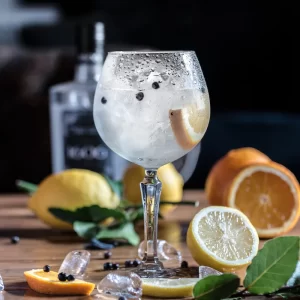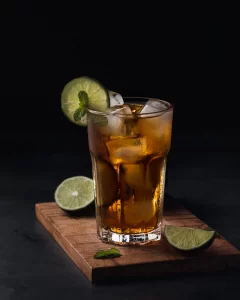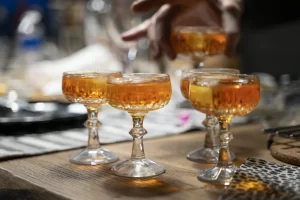Optimal Drink Choices for Individuals with IBS: A Guide to Spirits and Cocktails
Living with Irritable Bowel Syndrome (IBS) presents its fair share of challenges, particularly when it comes to dietary choices. For many individuals with IBS, alcohol can be a potential trigger, exacerbating symptoms and causing discomfort. In this guide, we’re going to cover why alcohol is an ibs trigger, whether avoiding alcohol completely is necessary, discuss alcohol options that are less likely to trigger IBS symptoms, and provide a better understanding of IBS itself. Let’s get started.
What Is IBS, Anyway?
Irritable Bowel Syndrome, or IBS, is a gastrointestinal disorder that affects the large intestine (colon). Symptoms include attacks of diarrhea and/or constipation that come and go for no clear reason. IBS is a chronic condition that requires constant management and often involves a combination of dietary modifications, stress management, and sometimes medication. The exact cause of IBS is still not fully understood, but it’s believed to involve a complex combination between how the intestines operate, internal lining sensitivity, and the relationship between the gut and the brain.
What Triggers IBS Flare-Ups?
IBS flare-ups can be set off by various factors. For many folks, what they eat plays a big role. Certain foods that are tough to digest, like fatty or spicy foods, can lead to trouble. Stress and emotions can also play a part, as your gut and brain communicate constantly, and this can cause your bowels to contract or seize up, moving waste faster or more slowly through them. Changes in your routine, like travel or sleep disruptions, might stir things up too. Even hormonal shifts can join the party. So, it’s a combo of food, feelings, habits, and body changes that can make IBS act up.
So, Is Alcohol an IBS Trigger?
Yes, alcohol can be a trigger for IBS symptoms. For many individuals with IBS, drinking alcohol can lead to discomfort and worsen their symptoms. However, the extent to which alcohol triggers symptoms can vary from person to person. Some types of alcohol might be better tolerated by certain individuals compared to others. It’s important for individuals with IBS to pay attention to their body’s reactions and make informed choices about alcohol consumption based on their personal experiences.
Why Does Alcohol Trigger IBS?
Alcohol can trigger IBS symptoms due to its impact on the digestive system. When you consume alcohol, it can lead to irritation and inflammation in the gastrointestinal tract. This irritation can make the intestines more sensitive and reactive, which can then result in the typical symptoms of IBS such as abdominal pain, bloating, and changes in bowel habits.
Additionally, alcohol can affect gut motility, which is the movement of the muscles in the digestive tract that helps push food and waste through. Changes in gut motility can disrupt the normal rhythm of digestion and contribute to symptoms like diarrhea or constipation.
Furthermore, alcohol can influence the balance of bacteria in the gut, which is known as the gut microbiota. This balance is important for digestion and overall gut health. Disruptions in the gut microbiota can potentially worsen IBS symptoms.
Should I Avoid Alcohol if I Have IBS?
As mentioned above, the decision to avoid alcohol when you have IBS depends on your individual tolerance and triggers. While some individuals find that even a small amount of alcohol can lead to uncomfortable symptoms, others may be able to tolerate certain types of alcohol in moderation. It’s important to pay attention to how your body reacts and to be mindful of your own triggers.
Is There Any Alcohol That Doesn’t Trigger IBS?
If you’re keen on enjoying a drink despite having IBS, it’s wise to opt for spirits and cocktails that are less likely to trigger symptoms. Clear spirits like vodka, gin, and white rum are generally better choices, as they have fewer congeners and additives that can contribute to digestive distress. Mixing these spirits with low-FODMAP mixers, like fresh citrus juices or tonic water, can further reduce the likelihood of triggering IBS symptoms.
Best Spirits and Alcohol for IBS
As mentioned above, clear is the way to go. Here are several options that you can consider when out with friends or at home:
- Vodka, flavored or unflavored
- Gin, all kinds
- White rum
- Clear tequila
- Sake
- Clear brandies
Spirits and Alcohol to Avoid With IBS
When it comes to spirits and IBS, some types of alcohol are more likely to trigger symptoms than others. Generally, beverages that have a higher content of certain compounds like congeners and additives can be more problematic for individuals with IBS. Congeners are natural byproducts of fermentation and can contribute to the taste, aroma, and color of alcohol, but they might also lead to more intense symptoms in some people.
Dark spirits such as whiskey, bourbon, and dark rum tend to have higher congener content, which could potentially make them more likely to trigger IBS symptoms. These congeners are believed to contribute to the irritation of the digestive tract and worsen symptoms like abdominal discomfort, bloating, and altered bowel habits.
Cider, sherry, port, and sweet wines are also not great options if you have IBS. High sugar alcohols tend to have negative effects on the digestive system if you struggle with IBS. Keep these things in mind as you consider what cocktail you’re going to order at the bar next time.
Mixers & Ingredients to Avoid With IBS
When it comes to enjoying spirits and cocktails with IBS, it’s not just the type of alcohol that matters. The mixers and ingredients you choose can also play a significant role in triggering or exacerbating symptoms. Here’s a closer look at mixers and ingredients to be cautious of if you have IBS.
High-FODMAP Mixers
FODMAPs (fermentable oligosaccharides, disaccharides, monosaccharides, and polyols) are a group of carbohydrates that can be hard to digest for some individuals, particularly those with IBS. High-FODMAP mixers like certain fruit juices (apple, pear, and mango) and high-fructose corn syrup can potentially contribute to symptoms like bloating, gas, and abdominal pain.
And, if you’re just now hearing about FODMAPS, check out FODMAPs and Irritable Bowel Syndrome.
Artificial Sweeteners
Artificial sweeteners like sorbitol, mannitol, and xylitol are commonly used in sugar-free mixers and cocktails. While they may seem like a good option for reducing sugar intake, these sweeteners can be challenging to digest and might lead to gastrointestinal discomfort for individuals with IBS. It’s advisable to read labels carefully (if you can) and avoid mixers containing these artificial sweeteners.
Carbonated Beverages
Carbonated mixers, including tonic water and soda, can introduce excess air into the digestive system, potentially causing bloating and discomfort. Additionally, the carbonation might increase the pressure in the gastrointestinal tract, which could trigger symptoms for those with sensitive bowels.
5 IBS-Safe* Cocktails for You to Try:
Now, let’s chat about some cocktails that are less likely to trigger your IBS symptoms. These options can be great if you go out with friends and want to enjoy a drink, too!
* Please keep in mind that ethyl alcohol tends to be a trigger for people, too. Over-indulging, even in IBS-safe cocktails, will likely lead to flare-ups, too.
#1: The Moscow Mule
This is a refreshing, simple drink that can be low-FODMAP if you use the right ingredients. For this drink, make sure the ginger beer is sweetened with a low-FODMAP sweetener.
- Fill a copper mug or glass with ice.
- Pour in 2 ounces of vodka. You can adjust this amount based on your preference for the strength of the drink.
- Squeeze in about 1/2 ounce of fresh lime juice. This adds a tangy and citrusy kick to the cocktail.
- Top off the glass with 3-4 ounces of ginger beer. Adjust the amount to your taste—more ginger beer for a lighter cocktail, less for a stronger flavor.
- Give the mixture a gentle stir with a stirring stick or spoon. Mixing will help blend the flavors together.
- Garnish the cocktail with a lime wedge and a sprig of fresh mint. The mint adds a wonderful aromatic element to the drink.
#2: The Lemon Drop Martini
Looking for something sweet and sour that won’t aggravate your bowels? This delicious martini is a great option. Make sure your simple syrup is low-FODMAP, though.
- Begin by chilling your martini glass in the freezer or by filling it with ice water to chill while you prepare the cocktail.
- In a shaker, add 2 oz vodka, ¾ oz freshly squeezed lemon juice, and ½ oz simple syrup.
- Fill the shaker with ice cubes.
- Put the lid on the shaker and shake well until the mixture is thoroughly chilled.
- Remove any ice or water from the martini glass and rim the edge with sugar. To do this, you can moisten the rim of the glass with a lemon slice and dip it into a plate of sugar.
- Strain the shaken mixture from the shaker into the sugar-rimmed martini glass.
- Garnish your Lemon Drop Martini with a lemon twist or a slice of lemon.
#3: The New Year’s Eve Sparkler
For something pretty and pink, combine 1 oz berry-flavored vodka, 1 ½ oz cranberry juice, and 3 ½ oz champagne in a Champagne flute. Garnish with raspberries on a skewer. This cocktail is fruity and delicious – just make sure your cranberry juice isn’t sweetened with a high-FODMAP sweetener.
#4: The Strawberry “Margarita”
To make four servings of delicious frozen strawberry margarita, start with 15-20 frozen strawberries. Combine these with 1 cup of crushed ice, 4 oz tequila, ½ cup freshly squeezed lime juice, 4 tbsp sugar or another low-FODMAP sweetener in a blender. Blend until smooth, about 5 minutes, then pour into glasses – this recipe makes four drinks.
You can garnish with lime wheels, fresh strawberry slices, and even mint!
#5: The Cosmopolitan
This cocktail is naturally low in FODMAPS, making it a great choice if you can’t read labels at the bar. To make a cosmo, follow these steps:
- Fill a cocktail shaker with ice cubes. This will help chill and dilute the ingredients as you mix.
- Add 1 ½ oz vodka, 1 oz cranberry juice, ½ oz triple sec, and ½ oz freshly squeezed lime juice to the shaker.
- Close the shaker tightly and shake vigorously for about 15-20 seconds. This ensures that the ingredients are well-mixed and chilled.
- Strain the cocktail into a chilled martini glass.
- If you like, garnish your Cosmopolitan with a twist of lime or a lime wheel. To create a twist, hold a thin strip of lime peel over the glass, skin side facing the cocktail, and gently twist it to release the oils. Run the twist around the rim of the glass before dropping it in.
Distillery Nearby: Your Home for Finding Low-FODMAP, IBS-Friendly, Local Spirits
Are you on the lookout for distilleries that offer low-FODMAP, IBS-friendly spirits that won’t disrupt your digestive peace? Look no further! Our distillery directory is your go-to resource for discovering local gems that cater to individuals with IBS and dietary sensitivities. We understand that finding spirits that align with your needs can be a challenge, which is why we’ve compiled a comprehensive “by-state” listing of distilleries so that you can find spirits that won’t trigger your symptoms.
Happy sipping!









